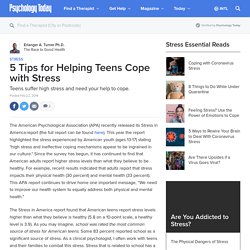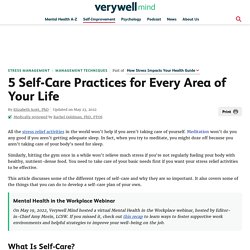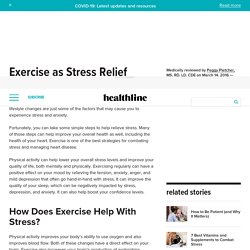

So how does Teenagers today manage and cope with stress? What is Stress? - The American Institute of Stress. Stress is not a useful term for scientists because it is such a highly subjective phenomenon that it defies definition.

And if you can’t define stress, how can you possibly measure it? The term “stress”, as it is currently used was coined by Hans Selye in 1936, who defined it as “the non-specific response of the body to any demand for change”. Selye had noted in numerous experiments that laboratory animals subjected to acute but different noxious physical and emotional stimuli (blaring light, deafening noise, extremes of heat or cold, perpetual frustration) all exhibited the same pathologic changes of stomach ulcerations, shrinkage of lymphoid tissue and enlargement of the adrenals.
He later demonstrated that persistent stress could cause these animals to develop various diseases similar to those seen in humans, such as heart attacks, stroke, kidney disease and rheumatoid arthritis. At the time, it was believed that most diseases were caused by specific but different pathogens. The Three Types of Stress. Understanding stress can help you know more quickly when you need help.

Stress is our built-in response to danger, a surge in hormones as we choose between fighting, fleeing, or freezing. The danger may be real or imagined, immediate or farther away; our bodies don’t know the difference. According to the American Psychological Association, the three types of stress — acute stress, episodic acute stress, and chronic stress — can all make us feel out of sorts or even ill, but chronic stress is often ignored. article continues after advertisement. What is Stress? Teenage Stress.
Teens are under more stress today than ever before.

Sound like an exaggeration? Despite the fact that I am often prone to hyperbole, consider this: being a teenager is not easy. Adolescence has always been a tricky developmental period defined by fundamental yet somewhat difficult changes (physical, cognitive, and social) experienced by teens as they make their way from childhood toward adulthood. These transitions trigger changes in the way the teen sees him/herself, and the way that others see and treat him or her. They are no longer children, but not yet adults, and this series of transitions not only has an impact on the individual experiencing the transitions, but also on parents, peers, and society as a whole.
Stress in Teenagers. Signs of Stress in Children & Teens. 6 common causes of stress in children and teenagers - and tips on how to cope... Most adults think of their childhood as the happiest time of their life, but children and teenagers are prone to suffering from stress too – which, because of its detrimental effect on their mood, can even lead to depression.

Studies show that almost one in four young people will experience depression before they're 19 years old, caused by peer pressure, school worries and a lot more. And with SATs exams coming up this spring for primary school children, plus GCSEs and A-Levels in secondary schools this summer, many young people may be feeling anxious. We asked the experts at CABA to share some of the common triggers and tips on supporting a child who is experiencing stress. Signs of Teen Stress. How does Stress and Tension affect Teenagers? Study finds teen stress may have health consequences later in life. Teen drama is all-consuming; jealousy and conflicts with friends can make adolescents feel the whole world is against them.

Now, new research from the University of Virginia has found ramifications from these conflicts may have long-term links to premature aging in adulthood. The clue to this new discovery was found in the bloodstream, in the form of something called interleukin-6, a protein that's been associated with the development of cancerous tumors, arthritis, osteoporosis and a number of other problems associated with aging. That substance was found at high levels in the bloodstreams of 28-year-olds who experienced chronic social conflict beginning at the early age of 13. Joseph Allen, UVA's Hugh Kelly Professor of Psychology, led the study, titled "The Body Remembers" and published in the journal Development and Psychopathology. Allen and his team began following 127 Charlottesville middle schoolers in 1998.
Why is this happening? Allen said the results are alarming. Effects of Stress on Teenagers. 5 Tips for Helping Teens Cope with Stress. The American Psychological Association (APA) recently released its Stress in America report (the full report can be found here).

This year the report highlighted the stress experienced by American youth (ages 13-17) stating "high stress and ineffective coping mechanisms appear to be ingrained in our culture. " Since the survey has begun, it has continued to find that American adults report higher stress levels than what they believe to be healthy. For example, recent results indicated that adults report that stress impacts their physical health (30 percent) and mental health (33 percent). This APA report continues to drive home one important message, “We need to improve our health system to equally address both physical and mental health.” article continues after advertisement The Stress in America report found that American teens report stress levels higher than what they believe is healthy (5.8 on a 10-point scale, a healthy level is 3.9).
5 Major Coping Strategies for Teen Stress Relief. How Self-Compassion Can Help Teens De-stress. In a 2014 national survey conducted by the American Psychological Association, 31 percent of adolescents aged 13 to 17 said that their stress increased in the previous year, and 42 percent said they were not doing enough to manage their stress.

Adolescents who experience frequent stress are more prone to depression and perform worse in school. How can teens foster emotional well-being during this often-turbulent time of life? Many teens turn to external sources—friends, family, hobbies. But what if they could turn inward and find support from within as well? In a recent study published in the Journal of Adolescence, Dr. The importance of Self-Care for Teenagers. 5 Self-Care Practices For Every Area of Your Life. Meditation won't do you any good if you aren't getting adequate sleep.

In fact, when you try to meditate, you might doze off because you aren't taking care of your body's need for sleep. Similarly, hitting the gym once in a while won't relieve much stress if you're only fueling your body with high-processed junk food. You need to take care of your basic needs first if you want your stress relief activities to be effective.
Self-Care for Teenagers. Exercise as Stress Relief. When you’ve been diagnosed with heart disease, you need to manage a number of new stressors on an ongoing basis.

Dealing with more frequent doctor visits, getting used to new medical treatments, and adjusting to lifestyle changes are just some of the factors that may cause you to experience stress and anxiety. Fortunately, you can take some simple steps to help relieve stress. Many of those steps can help improve your overall health as well, including the health of your heart. Stress Mangement for Teens: The Power of Exercise. This article was written by Nora Laberee, a former CPTC research assistant.

Physical exercise can be subject to a risk of serious injury. Listen to your body. Consult a doctor before using workout equipment or starting any routine program. Exercises as Stress Relief for Teenagers. Start every day with a good night’s sleep. How many hours a week do teenagers spend on homework? The average teenager spends more than 15 hours a week on homework. On a typical school night, they spend over 2 hours on homework.
The more stress a teen feels, the more likely they are to spend even more time on homework. How Sleep helps alleviate Teen Strees? How Picking Up a New Hobby Relieves Stress. Hobbies are often thought of as activities for people who lead quiet, relaxed lives, but people with full, busy, even stressful lives may need hobbies more than the average person. Hobbies bring many benefits that usually make them more than worth the time they require. Here are some of the advantages of having hobbies. One study found that those who engage in physical leisure activities for at least 20 minutes once a week are less susceptible to fatigue. Other research found that enjoyable activities performed during leisure time were associated with lower blood pressure, total cortisol, waist circumference, and body mass index, and perceptions of better physical function.
Such activities were also correlated with higher levels of positive psychosocial states and lower levels of depression and negative effect. The importance of having Hobbies for stress relief. Talking About Your Stress: A Simple Way To Put It in Perspective. Stress does not discriminate. No one is immune from the strains and pressure of everyday life. It is caused by work, school, family situations or just general worry. Treatment for stress has been getting lots of attention, and from meditation to exercise, there are almost as many ways to try and deal with it as there are causes.
One method is easily overlooked, but incredibly effective. It is suitable for sufferers of all ages and abilities, causes no side effects, and doesn’t have to cost a thing. How It Works. Why talking helps relieving teenager stress? Who should Teenagers talk to?